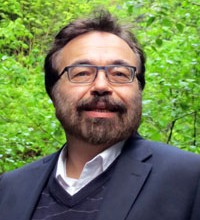Adaptive Sketching and Validation for Learning from Large-Scale Data
We live in an era of data deluge. Pervasive sensors collect massive amounts of information on every bit of our lives, churning out enormous streams of raw data in various formats. Mining information from unprecedented volumes of data promises to limit the spread of epidemics and diseases, identify trends in financial markets, learn the dynamics of emergent social-computational systems, and also protect critical infrastructure including the smart grid and the Internet’s backbone network. While Big Data can be definitely perceived as a big blessing, big challenges also arise with large-scale datasets. This talk will put forth novel algorithms and present analysis of their performance in extracting computationally affordable yet informative subsets of massive datasets. Extraction will effected through innovative tools, namely adaptive censoring, random subset sampling (a.k.a. sketching), and validation. The impact of these tools will be demonstrated in tasks as basic as regression and clustering of high-dimensional, large-scale, and dynamic datasets emerging with power and social network applications.

Georgiios Giannakis
Professor of Electrical and Computer Engineering, University of Minnesota on April 21, 2017 at 11:45 AM in Engineering Building III, Room 2213
Georgios B. Giannakis (Fellow’97) received his Diploma in Electrical Engr. from the Ntl. Tech. Univ. of Athens,
Greece, 1981. From 1982 to 1986 he was with the Univ. of Southern California (USC), where he received his
MSc. in Electrical Engineering, 1983, MSc. in Mathematics, 1986, and Ph.D. in Electrical Engr., 1986. He was
with the University of Virginia from 1987 to 1998, and since 1999 he has been a professor with the Univ. of
Minnesota, where he holds a Chair in Wireless Telecommunications, a University of Minnesota McKnight
Presidential Chair in ECE, and serves as director of the Digital Technology Center. His general interests span
the areas of communications, networking and statistical signal processing – subjects on which he has
published more than 400 journal papers, 700 conference papers, 25 book chapters, two edited books and two
research monographs (h-index 124). Current research focuses on big data analytics, wireless cognitive radios,
network science with applications to social, brain, and power networks with renewables. He is the (co-)
inventor of 30 patents issued, and the (co-) recipient of 8 best paper awards from the IEEE Signal Processing
(SP) and Communications Societies, including the G. Marconi Prize Paper Award in Wireless Communications.
He also received Technical Achievement Awards from the SP Society (2000), from EURASIP (2005), a Young
Faculty Teaching Award, the G. W. Taylor Award for Distinguished Research from the University of Minnesota,
and the IEEE Fourier Technical Field Award (2015). He is a Fellow of EURASIP, and has served the IEEE in a
number of posts including that of a Distinguished Lecturer for the IEEE-SP Society.
The Department of Electrical and Computer Engineering hosts a regularly scheduled seminar series with preeminent and leading reseachers in the US and the world, to help promote North Carolina as a center of innovation and knowledge and to ensure safeguarding its place of leading research.
